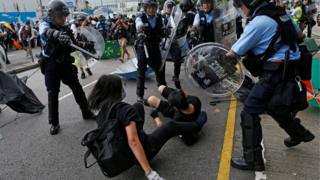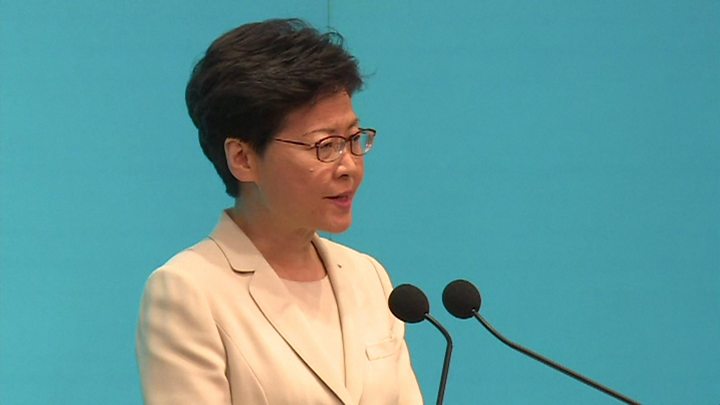Hong Kong: Police and protesters clash on handover anniversary
 Image copyright Reuters
Image copyright Reuters Police in Hong Kong have clashed with protesters marking the anniversary of its handover from UK to Chinese rule.
In chaotic scenes on Monday, police used pepper spray and batons to contain demonstrators outside a venue hosting the annual flag-raising ceremony.
A group of protesters later tried to break into the government building.
Huge protests have taken place in recent weeks over an extradition bill, which would allow people to be sent to mainland China for trial.
The government has agreed to suspend it indefinitely, but the rallies continue and Chief Executive Carrie Lam is facing ongoing calls to resign.
Pro-democracy events are held every year to mark the handover. Large crowds are expected to attend a march and rally later on Monday, but police are now urging the organisers to shorten or cancel the event over safety concerns.
What has been happening so far on Monday?
The flag-raising ceremony to mark the handover took place inside the Hong Kong Convention and Exhibition Centre, amid heavy police presence.
Authorities said demonstrators began blocking several roads near the venue early on Monday morning, using items like metal and plastic barriers to block the way.
Outside the Convention and Exhibition Centre, police officers equipped with shields and batons clashed with hundreds of protesters around 30 minutes before the ceremony, local outlet SCMP reported.
Police also used pepper spray to disperse the crowd.
News agency AFP said at least one woman was seen bleeding from a head wound after the clashes.
A police statement condemned “illegal acts” by protesters, who it said had taken iron poles and guard rails from nearby building sites.
The force later said 13 police officers had been taken to hospital after protesters threw an “unknown liquid” at them on Monday morning. Some were said to have suffered breathing difficulties as a result.
Around lunchtime local time, a breakaway group of protesters moved to the Legislative Council building (LegCo), where the government meets, and attempted to break down the glass doors using a metal trolley.
Riot police could be seen just inside the building.
Police have called on protesters to stop all acts of violence, and are asking the public the avoid the area around LegCo.
Speaking at the flag ceremony in the morning, Hong Kong’s leader Carrie Lam said she realised she needed to spend more time listening.
“I will learn the lesson and ensure that the government’s future work will be closer and more responsive to the aspirations, sentiments and opinions of the community,” she said.
It was Ms Lam’s first public appearance since 18 June, when she issued an apology for her handling of the extradition law.
Why have people been protesting?
Hong Kong, a former British colony, has been part of China since 1997 under the “one country, two systems” principle, which allows it freedoms not seen on the mainland, including judicial independence.
The extradition bill raised concerns for that status.
Critics of the bill feared it could be used to target opponents of the government in Beijing, and to bring Hong Kong further under China’s control.
On 12 June police used tear gas and rubber bullets to disperse crowds marching against the bill – the worst violence in the city in decades.
Eventually, the demonstrations forced the government to apologise and suspend the planned extradition law.
However, many protesters said they would not back down until the bill had been completely scrapped.
Many are still angry about the use of police violence in the 12 June protests, and have called for an investigation.
“The Hong Kong police’s well-documented use of excessive force against peaceful protesters urgently demands a fully independent investigation,” said Sophie Richardson, China director at Human Rights Watch in a statement.

Media playback is unsupported on your device
However, there have also been smaller demonstrations from the territory’s pro-Beijing movement.
On Sunday, thousands of pro-Beijing protesters rallied in support of the territory’s police.
One pro-Beijing protester told AFP police were just trying to “maintain order”, calling the anti-extradition protesters “senseless”.




